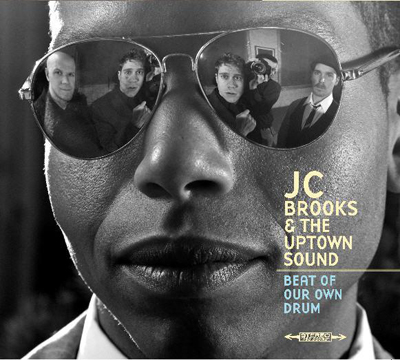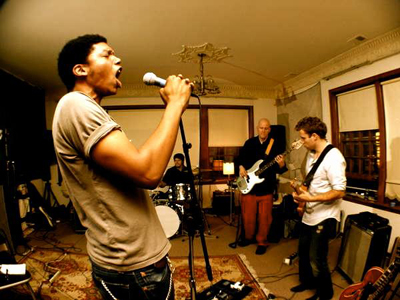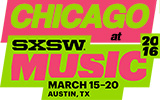| « Whole lotta Shaking Going On...in Hell | Wilco Announces Tour, Doesn't Mention Chicago » |
Feature Thu Feb 19 2009
Getting Down with JC Brooks & The Uptown Sound
In addition to being the sharpest-dressed band in Chicago, JC Brooks & the Uptown Sound have been taking the city by storm with their unique brand of raw power soul.
The quartet consists of guitarist Bill Bungeroth, drummer Kevin Marks, bassist Ben Taylor, and vocalist JC Brooks. Melding an old-school vibe with modern-day punk influences, the band is quickly gaining a reputation for its raucous live shows and JC's volcanic singing abilities. The band won last year's Metromix Rock 'n' Vote competition and has been steadily growing in popularity. Their new album Beat of Our Own Drum drops on February 28th and is sure to garner mountains of praise. I spoke with 3/4 of JC Brooks & the Uptown Sound about the state of soul music today, recording an album in one weekend, and auto-tune overkill.

Gapers Block: You're definitely a modern-day soul band. Your mixture of Motown soul and raw soul has been compared to Otis Redding and Syl Johnson, but people have also compared you to The Stooges and Fugazi. Do you think that is an accurate depiction?
Kevin Marks: Yeah I think so. Our guitarist, Bill has brought that Stooges feel and passion to the mix. We definitely are a soul band adding some other elements.
JC Brooks: I think you can argue for all of them being accurate to some extent, like Syl. Despite being 70, he still has a hell of a lot of energy and we try to bring an energetic show. I do agree that the sound is a cross between Otis Redding and The Stooges. That's something that Bill came up with early on and it really suited us, so we stuck with it. I definitely enjoy the mix of the sound, but I don't know if even that sums us up entirely. The Stooges had this wild abandon in their shows, and Otis Redding brings to mind that classic soul, so I think summing up the feel of our music that way is more accurate.
Ben Taylor: We definitely love soul music.
GB: Why soul? I read that you guys all had different influences and some of you played in punk bands when you were younger.
BT: We love the music. It's such a more direct approach. Getting that audience reaction is very gratifying, because it's not a show where people just stand there and maybe even cross their arms. People dance and yell and respond to it.
JC: Well, I just answered this Craigslist ad because I was in a lull and I needed something to do. [Laughs.] I didn't set out to join a soul band necessarily. The vision behind this is all Bill's. I just wanted a band where I could cut loose. When we started, I was doing a theater show that was really rigid. I started scouring the Craigslist ads so I could have an artistic outlet and show more of myself.
GB: So you're an actor. Do you remember the first time you performed with a band?
JC: In high school, [my band] had a show booked at this coffee house for a school fundraiser. We needed a name so we named ourselves after the first sign that we saw: Deaf Child Area. [Laughs.] We did four or five originals, and all the rest were Nirvana covers like "Marigold". It was a lot of fun, but it was a lot of unstructured music. It was a place for us to be reactionary and to pour out our frustration. Right now, I feel like I'm involved in a musical project, whereas that was just a band. When the Uptown Sound gets together, we talk about the style of the music and in that first band we just wanted to spit out songs. It was all about speed and energy and volume. While those aren't bad things, it's cool to add layers to the actual musicianship and the consideration. We're crafting something as opposed to doing something.
GB: Your band definitely has a nostalgic vibe, and it seems like soul is coming back. Artists like Raphael Saadiq and Al Green really made an impact in 2008. How do you think that fits in with today's music?
JC: I think it directly opposes to today's music and that's why it's coming back. For the longest time I was really cynical of that. There's no such thing as taste anymore. The stuff that's on the radio is the stuff that's actually making people money, which is terrible, terrible music. But if it's making money, then it means that a whole lot of people out there like some terrible over-produced auto-tuned garbage. I think that the authenticity behind soul is what's driving it to come back. Then again, I don't listen to a lot of today's music. Soul isn't afraid to make a mortal metaphor for love, like when talking about loving someone to death. It just seems that lyricism nowadays doesn't have any balls. I'm only talking about pop. There's still a lot of great musicianship out there, but as far as what is getting to the public...
KM: I think that soul is coming back because people want it to come back. One thing I have noticed, especially live, is that there is no motivation for people to move. I think we kind of bring it to them and get them out of their shell. I've played with other bands. I'm about to be 32, and I've been playing since I was 16, and I've noticed everyone dances at our shows. Not only is it the groove, but also the soul and the way Jayson works the mike as our frontman. You don't see that too often these days. The frontman is talking to you and getting everybody involved. It's not just where you sit back and listen while we play songs to you. Everybody is involved and that's where all this energy comes from. Especially live, we really involve the crowd and put out good soulful, groovy music. The post-punk just adds that whole other element.
BT: This soul revival has been bubbling underneath for a while. The whole reason I got into older soul and funk is because of samples. I heard them from Beastie Boys and A Tribe Called Quest, and that's where I got into funk music. People just continue to pick that music up because it still sounds good and it's timeless.
JC: It's so great that Raphael Saadiq and Al Green are making an impact and selling records because more people realize that there is an alternative. Many people got turned off from listening to the originals because they didn't want to listen to their parent's music. When I was younger I had the same exact kind of backlash. Now, some of my favorite music is Stevie Wonder and Steely Dan. It's the same stuff that I used to hate when my mom put it on. Presenting old stuff in a new way is tricking pop listeners into giving it a shot.
GB: It's funny that you mention listening to music your parents listened to and hating it at the time. I remember hating Bob Marley and INXS because my dad used to play it all the time, but I came back to it.
JC: During Christmas, my mom and I were having this conversation about Anita Baker. We were just talking about her catalog and what songs are better. We just kept one-upping each other. It felt kind of weird to have this rapport and kinship with my mom and her musical tastes, but it's also cool.

JC Brooks & The Uptown Sound (photo by Fuzzy Gerdes)
GB: How do you think your band fits in with the Chicago music scene?
KM: Another thing I have noticed is that no matter what band we're booked with the crowd appreciates what we're doing. It's cool that we're reaching out to all sorts of avenues and cliques. We don't have one niche. We have that retro thing that people are all about, but we also have elements of everything else. We have played with indie bands where the audience started off down, and they were dancing too. We play for the old and young.
GB: A lot of these older soul albums are brimming with character. Is it difficult to replicate that sound?
JC: In my eyes, we're not even trying to replicate that sound from a technical perspective. We're just trying to get that feel of not having the luxury of being to able to track every instrument and adding a million punch-ins. We're trying to get it in one take and have everybody in one room. Just having the togetherness there or pretending that you only get one take is crucial to getting that urgency in our sound.
BT: All the tools are still out there for us to capture that character. We're using Fender guitars. We're not using anything that's uncommon to this music, but we're also not trying to replicate anything. That has been one of our goals. We're always talking amongst ourselves about how we're trying to do something different and not trying to recreate an era that has passed. We're not interested in trying to recreate something and we've always taken a very organic approach. It's been very natural to be combining these elements of punk rock and everything else we've grown up with just because we're looking to make new music that is ours.
GB: What was your experience like recording Beat of Our Own Drum?
BT: We financed it ourselves, so it's the classic tale of not enough time and not enough money. It was really just recording our live set. We didn't even really have a plan for what we were going to do with the songs. It felt a little rushed, but we really showed that we could pull it off. The album was pretty much recorded live. We went in, we set up, we played, and that's what came out.
KM: It was great. It was our first time making a record and it was nice to put down the stuff on tape that we had going. It was also a quick process because we laid most of the tracks down in a weekend. We did it quick and it's a real live-sounding record. With our first record, we wanted to represent how they did it back in the day. There weren't a lot of overdubs, so what you have is what you have. There's a part in "Baltimore is The New Brooklyn" where Ben just kind of yelled because he was feeling good. You keep that stuff. It's not this pretty production where everything is precise and auto-tuned. It's pretty raw, and I appreciated that aspect of it.
GB: So you aren't going to bring in auto-tune backup singers any time soon?
KM: [Laughs.] No. Sometimes [auto-tune] can work in a little part. The fact that people are using it as a standard now is really horrible I think. Mistakes make it real and make it personal. I think having a couple flaws makes it completely real. Having everything so perfect just doesn't make sense for me.
GB: "75 Years of Art Sex" is a great jam. What are your feelings about that song?
JC: It's about someone who thinks that they love you. You can't fault them for genuinely believing that they love you, but they have their own agenda and motivations. I think of it in really broad or cinematic terms about someone who has to choose the job of their dreams or the man or woman of their dreams, and they end up choosing the job. Maybe it's a song about taking someone for granted, thinking that they'll be there when you get back from whatever. This is kind of what it has been about for me: choosing what you love over what you say you love.
GB: I think one of the coolest parts of your album is the actual cover. What's the story behind that?
KM: Ben Reed, who did the photography and the layout, put that all together. He did a fabulous job. When we saw it we couldn't be happier, because it's huge to have the first record have such a dynamic look to it. If a CD catches your eye like that, then it's a big plus for us.
BT: We wanted something that wasn't going to directly refer to anything. These days, it seems like everything is an ironic reference to something. To me, it does evoke some older style and it seems to have a timeless quality. The way the photographer shot it, we didn't want to Photoshop anything. We just wanted it to seem real.
GB: Any big plans for 2009?
JC: Just to play as much as possible and to break out of the Chicago/Iowa loop. We've played in other places, but that's where we have played the most. We have a decent following up here, but I think the goal for 2009 is trying to get further out and get the ears of the kids out there. They're the ones who are going to be spreading the word with blogging and the MySpace and whatever else the kids do.
KM: We want to start thinking nationally. We definitely want to get in front of crowds, so we're working on making contacts with national acts. We've been trying to contact Raphael Saadiq, because he put out that new soul record. Our hope and goal for this year is not only to keep playing and writing for the next record, but also to get in front of more people. The one thing we have found out we can do is even if we're opening, we can really grab any audience.
JC Brooks & the Uptown Sound will be performing their record release show Saturday, February 28th at The Empty Bottle, 1035 N. Western Ave. Tickets are $8 and you can call 773-276-3600 for more info. Their new album Beat of Our Own Drum will be available for download at CD Baby and iTunes, or you can just grab a copy in person at the release party.
About the Author:
Raf Miastkowski is a graduate of Loyola University Chicago and a former intern at The Onion's A.V. Club. He enjoys obsessing over the White Sox, kung-fu movies, artificial intelligence research, Mongolian history, Point Break, and chicken wings.
















Seth Patner / January 19, 2010 1:27 PM
THE BLOODY WHITE BARON
Great interview! We just saw JC and crew warm up the crowd at Lincoln Hall and I've already got the CD! The interview answered a lot of my questions about this new phenomenon. BTW,
if you're really into Mongolian history, check out the book below:
The Bloody White Baron:
The Extraordinary Story of the Russian Nobleman Who Became the Last Khan of Mongolia
By James Palmer